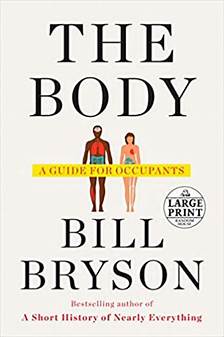By John Branston
Bill Bryson is the author of The Body, A Guide for Occupants, an informative and amusing head-to-toe 444-pages (including 38 pages of notes and sources) that ought to be read by R.F.K. Jr. It came out in 2019. Trump was president and Covid 19 was lurking around the corner.
Bryson is not a doctor but author of books about the Appalachian Trail, world travels, boyhood and “the history of nearly everything.” He deftly explains that while there is a great deal of doubt, disagreement, error, and uncertainty in medical history, that is not the same as bogus claims like some of the ones Kennedy believes, even as he is sometimes right.
Here is a sampling.
On viruses: “A lot of viruses are not bad news at all, at least not to humans . . . they do not propel themselves, they hitchhike . . . like bacteria they are incredibly successful . . . something else viruses do is bide their time.”
On cardiovascular disease: “Until the 1940s, the principal focus of health care was with conquering infectious diseases . . . (later) it became evident that we had another growing epidemic on our hands.”
On pacemakers: The first one was the size of a pack of cigarettes, now they are no bigger than a quarter and can last ten years.
On heart disease: “Even with all the improvements in care, you are 70 percent more likely to die from heart disease today than you were in 1900 because other things used to kill people first and people didn’t spend six hours an evening in front of a television with a tub of ice cream.”
On cancer and pain: “Most cancers don’t cause pain in their early stages. All too often it becomes evident only when it is too late to be useful.”
On epidemics: “A successful virus is one that doesn’t kill too well and can circulate widely. . . The great Spanish flu of 1918 racked up a global death toll of tens of millions by being persistent and highly transmissible. It killed only about 2.5 percent of its victims.”
On irony: Diphtheria killed 15,000 Americans a year in the 1920s but thanks to vaccines kills about a five a decade now. The microbiologist Louis Pasteur lost three of his five children to typhoid fever. Smallpox, the “most devastating disease in the history of humankind,” was eradicated from the Earth in 1980.
On lifestyle disease: “If we want to be healthy we need to eat and move about a little more like our ancient ancestors did . . . Failure to do that is giving us disorders like type 2 diabetes and cardiovascular disease. Medical care is making things worse by treating the symptoms.”
On statistics: The average American male lives to be 78, females to 80. But there are problems with those figures. They are skewed by childhood deaths from infectious diseases (way down since 1900) and extended old age. “We have never had it so good if we are reasonably well off. One thing that should concern us is how unequally the benefits of the last century have been shared.” The United States is 31st in global life expectancy.
Old Joke about preventive treatment: What is the definition of a well person? Someone who hasn’t been examined yet.
A personal note: Oddly, fluoride does not even appear in the index of “The Body” but since R.F.K. brought it up (in a bad way) I will add this. The first city in the United States to have fluoridated water was Grand Rapids, Michigan, in 1946. I grew up there and received the benefits of fluoride, which were offset by two things: penny candy and television advertising. If you are in the golden years, you will remember the ads for scrumptious candy, healthy cigarettes, and toothpaste with gardol and stuff that would make you wonder where the yellow went.
If R.F.K. gets the gig, he should ban TV ads for Big Pharma, which are only allowed in the USA and New Zealand. But that would make too much sense and bust broadcast news which depends on it.
**
John Branston covered Memphis as a reporter and columnist for 35 years.




